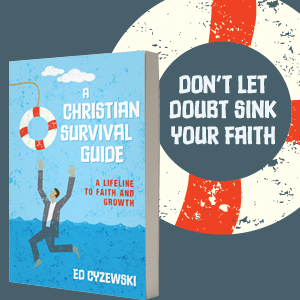Every time I read something Ed Cyzewski has written, I feel he wrote it just for me. Ed puts words to so many of my questions, doubts, and struggles of faith – and always offers a way forward. Today he’s sharing a bit from his brand new book: A Christian Survival Guide. I think you’ll resonate with his story.
When I realized I was ashamed of the gospel, I feared losing my salvation.
I’ve been told that REAL Christians share their faith and aren’t ashamed of the gospel. In fact, I’ve been told that if I didn’t share my faith at EVERY opportunity, I’m actually ashamed of the Gospel and Jesus would deny me (Matthew 10:33).
Talking to strangers is pretty much the last thing an introvert like me wants to do, but when an evangelism class in seminary required that I share my faith ten times every week, I finally had a crisis of faith and sanity.
I had constant anxiety attacks about evangelism . . . even while shopping . . . at Wal-Mart.
We could make ourselves insane with evangelism.
If every person is an eternal soul who could end up in hell suffering for the rest of eternity, shouldn’t we walk from person to person every minute of every day asking them if they know Jesus?
Whether you’re afraid of Jesus denying you one day or of your neighbors roasting in hell for eternity, there is a ton of guilt, shame, condemnation, and fear generated by evangelism strategies today.
Perhaps that sounds over the top to you, but if we follow some of our evangelism teachings to their natural conclusions, we have a recipe for nervous, pushy, and awkward Christians who try to share their faith whether or not it’s the right time or the right person. And in case you hadn’t noticed, we have quite a lot of them. If there really is so much at stake — eternal separation from God — then shouldn’t we evangelize door to door like the Mormons and Jehovah’s Witnesses?
What is a faithful follower of Jesus to do? We are commanded to make disciples, but how should we do that and how frequently? Can faithful Christians neglect this charge to make disciples? Are we damning people to hell if we don’t share our faith constantly? Are we failures as Christians if we’re too ashamed of Jesus to evangelize? Will Jesus deny us one day?
Here’s a crazy idea about evangelism: What if we started with God’s love?
Rather than Jonathan Edward’s God who holds sinners over the fires of hell like a summer barbeque gone wrong, what if we started with that little known verse in John 3: “For God so loved the world…”
If you are in “the world,” then you qualify for God’s love. Congratulations.
When we have a clear view of God’s love for us, he’ll start to change us. When we are shaped into his kind of people, we’ll see things from his perspective. Motivated by God’s parent-like love and guided by the Spirit, we are in much better shape to talk about the good news of Jesus. In fact, once we’ve embraced it fully, we’ll struggle to not talk about it.
We’ve been told that we have to figure out how we’re going to discuss Jesus with talkative Sally at the office, David the agnostic brother, or Butch your buddy who only speaks of sports and acquiring firearms before the liberal take over of America. Thankfully we don’t all have to be like the gregarious and confident experts who tell us that we can steer every conversation to Christ — though some will be all over that approach.
For the rest of us, let me introduce you to Lesslie Newbigin.
Newbigin served as a missionary in India for over thirty years, giving him some serious gospel-sharing chops. In his book The Gospel in a Pluralist Society he offers a way forward that may strike some folks as counterintuitive. However, I encourage you to give it a shot. He suggests that the gospel was shared in the book of Acts only as a result of conversations sparked by actions and the Holy Spirit’s work. In other words, the Christians were empowered by the Spirit to act, and that prompted people to ask questions.
Perhaps Lesslie Newbigin explains sharing the gospel best:
The intimate link between the acts and words is made very clear in the mission charge to the twelve as it is given in the tenth chapter of Matthew. At the outset this is simply a mandate to heal and exorcise. . . . Only in verse 7 do we read: ‘”Preach as you go, saying, ‘The kingdom of heaven is at hand.'”
. . . Here I may refer again to the point to which I drew attention earlier, namely that almost all the great Christian preaching in Acts are made in response to a question. Something has happened which makes people aware of a new reality, and therefore the question arises: What is this reality?
The communication of the gospel is the answering of that question.
Newbigin suggests: Figure out what the Holy Spirit wants us to do, do it, and then answer the questions that come.
Get out there and do what God wants, and then trust him to provide the opportunities and results. My current church spends half of its budget on providing family homes for orphans, and that alone sparks plenty of conversations with our neighbors about the gospel. After all, God has adopted us into his family.
See how this could work?
Such a nonassertive approach feels so un-American, and of course, that’s true. Newbigin was British and lived much of his life as a missionary in India.
His experience and interpretation ring true to me. God places burdens on our hearts, leads us into situations, and brings up conversations that will enable us to speak about him, his love, and his saving work. In addition, as we face adversity with grace, accept scorn with humility, give our money to charities, serve alongside the struggling, and repay evil with good, we’ll say quite a lot about the work God is doing in us.
It’s not always up to us to make gospel-sharing situations happen, but we are responsible for listening to God’s lead, displaying the power of God daily, and then acting when opportunities arise. John Cameron, an old farmer friend of Oswald Chambers once suggested that Chambers speak to his ploughman about Jesus if he got “permission to speak.” When Chambers asked what he meant, wondering why Cameron hadn’t spoken to the man himself, Cameron replied, “My laddie, if you don’t know what the permission of the Holy Ghost is in talking to a soul about salvation, you know nothing about the Holy Ghost.”
Sharing the gospel requires spending time with God to figure out what to do rather than forcing conversations.
This means that we aren’t just sharing the Gospel when we try to “talk” about Jesus. We are always on the clock.
This is both a little less intimidating for introverts like me and infinitely more demanding. In other words, you are proclaiming the good news when you respond to a critic with kind words or choose to forgive when cheated. We can show that we are living for the rewards and praise that come from God by allowing the love of God to lift us above the smaller concerns of this world.
Guilt and fear have been conquered on the cross. They have no place in sharing the Gospel.
There are many different ways we can share the gospel, but it should never be motivated out of guilt or duty. The good news of God’s loving salvation should also never be forced upon anyone. Christianity is relational and rooted in love.
Some folks can take the direct approach, while others will be better able to engage in service to the poor as a means of proclaiming the gospel. Both are ways of saying that God has turned our world upside down in Christ, promising that the meek will inherit the earth, the humble will be lifted up, and those who love even to the point of death will be raised to new life.
__________________________________
This post has been adapted from A Christian Survival Guide: A Lifeline to Faith and Growth. It’s $2.99 on Kindle and Nook August 19-22. Learn more here.
Ed Cyzewski is the author of Coffeehouse Theology and A Christian Survival Guide. He writes about imperfectly following Jesus at edcyzewski.com. He lives in Columbus, OH with his wife and two sons where they obsess over New York style pizza and organic gardening. Connect on Facebook or Twitter.
[ image: Martin Gommel ]
published August 20, 2014
subscribe to updates:
(it's pretty much the only way to stay in touch with me these days)


